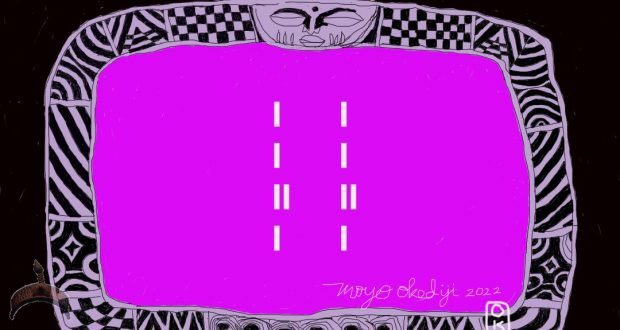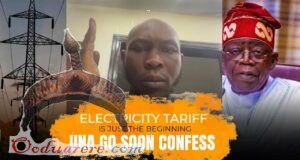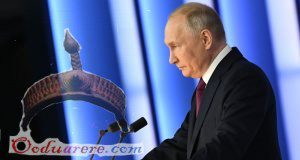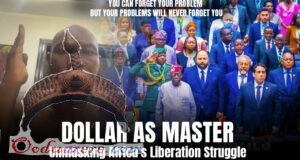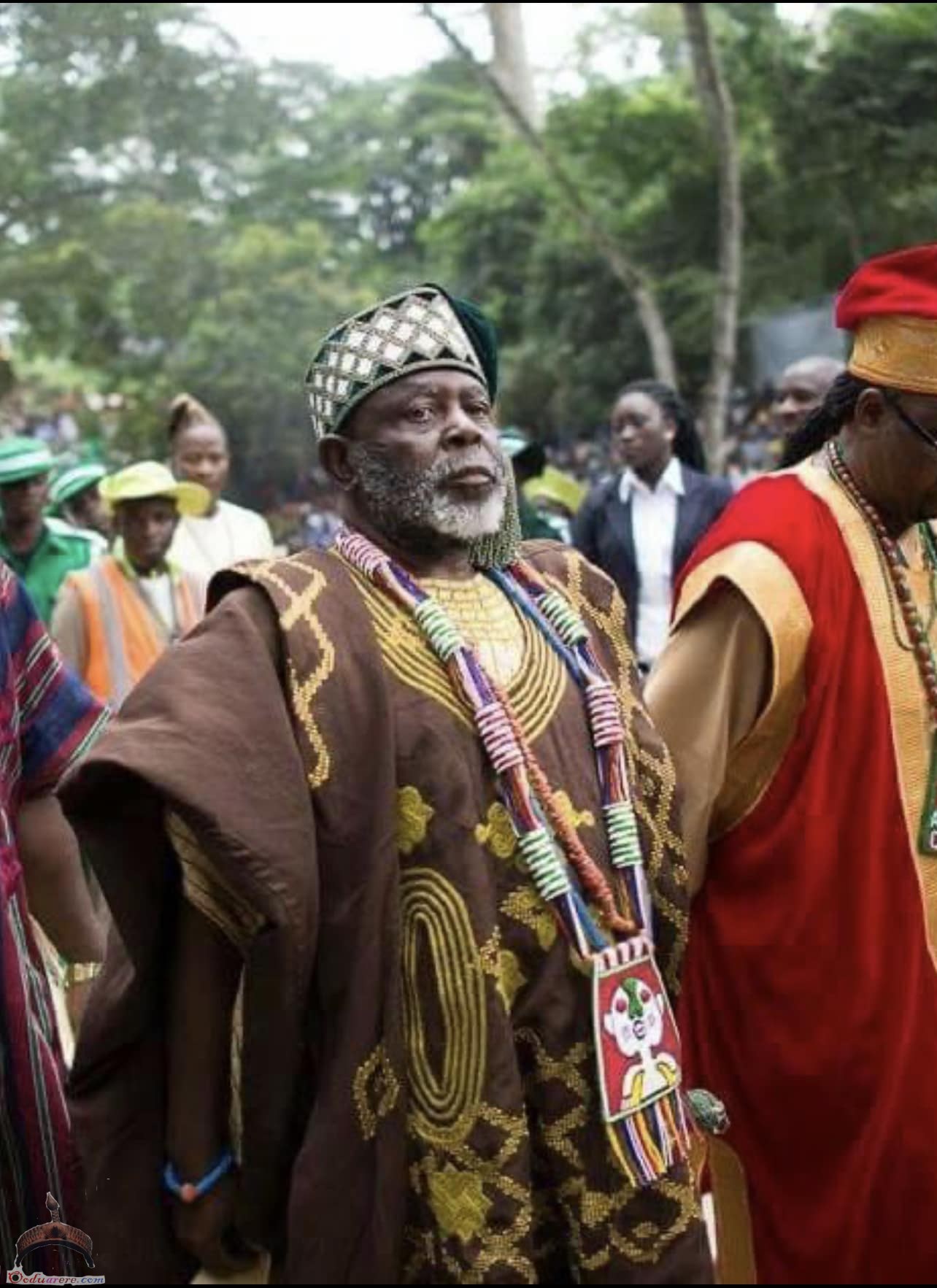You will find the answer to the riddle in Ìrẹtẹ̀ Méjì.
Orunmila was a monarch, who gave birth to several other monarchs including Alárá, Ajerò, Ọlọ́wọ̀ and several others.
You will also find out in Ìrẹtẹ̀ Méjì why Yoruba people (ọmọ a yọ orù bá wọn tọ́jú) do not die, but climb the rafter.
You can read the entire Yoruba and English translations or you may just go straight to the English version at the bottom of this post if you don’t read Yoruba.
O̧mọ a yọ orù bá wọn tójú (The child raised with Oru pot)
Kò tiẹ̀ kú mọ́ (Does not die)
Ẹkún arira lẹ̀ ń sun (You are weeping for the Arira tree)
O̧mọ a yọ orù bá wọn wò dàgbà (The child raised with Oru pot to adulthood)
Kò tiẹ̀ kú mọ́ (Doesn’t die)
Ẹkún arira lẹ̀ ń sun (You are weeping for the Arira tree)
Ìrẹtẹ̀ méjì.
Tí à n pe ni Èjì ẹlẹ́mẹ̀rẹ̀
Ó ní ká dijú dijú
Ká ṣe bí ẹni tó kú
- Ká wẹni tí ó sunkún ẹni
Ká bùrìn, bùrìn, bùrìn
Ká fẹsẹ̀ kọ
Ká wẹni tí ó ṣe ni pẹ̀lẹ́
A dífá fún Ọ̀rúnmìlà - Níjọ́ tí baba ó fikú tan mọ̀lẹ́bí ẹ jẹ.
Ọ̀rúnmìlà òpìtàn, ó ní bí gbogbo ènìyàn ṣe ń jó lé òun lọtǔn
Tí wọ́n ń yọ̀ mọ́ òun lósì
Òun fẹ́ mọ àwọn tó fẹ́ òun dénu nínú wọn
Òun fẹ́ mọ bí wọ́n ṣe fẹ́ òun dénú sí - Ọ̀rúnmìlà bá gbéra lọ́jọ́ kan
Babá lọ sí inú igbó
Ni ó wá lọ gbé igi arira
Ó gbẹ́ ẹ ní ère
Gẹ́gẹ́ bí èèyàn - Ó wá gbé e sínú ilé
Ó wá da aṣọ funfun bò ó
Ọ̀rúnmìlà wá pe Amósùn
Tí í ṣe ọmọ rẹ̀
Ó ní kó lọ kéde pé - Babá mà ti papòdà o
Sí gbogbo àwọn mọ̀lẹ́bí òun
Ọ̀rúnmìlà wá gun òkè àjà lọ
Láti lè mọ gbogbo ohun tó ń ṣẹlẹ̀.
Ni Amósùn bá dé ọ̀dọ̀ Ògún - Ó ní baba òun ló sùn ní àná
Tí kò jí ní àárọ̀ yǐ o
Ó ní kí Ògún wá bá àwọn mú aṣọ kúrò ní ojú u rẹ̀
Àti bí àwọn yíò ṣe ṣe ètò ilẹ̀ gbígbẹ́
Nítorí ìwọ Ògún - Ìwọ ni o nirin.
Ògún ní “Á à; Ọrúnmìlà tí kú.”
Ó ní Ọlọ́run ló mú u.
Ògún ní kí òun tó lè jáde nínú ilé
Ó ní òun yíò gba igba ajá - Ni Amósùn bá gbéra lọ sí ọ̀dọ̀ Ṣàngó.
Ó kó ẹjọ́ ó rò;
Gbogbo ohun tí ojú òún rí.
Sàngó ní kí òun tó lè jáde rárá
Òun ní láti gba igba àgbò - Ni Amósùn bá kúrò níbẹ̀
Ó gba ọ̀dọ̀ Ọ̀ṣun Oníbú ọlà lọ.
Amósùn dé ọ̀dọ̀ Ọ̀ṣun
Ó ní ohun báyìí, báyìí, báyìí,
Ni ó mà ṣe baba òun - Àsùnmọ́jú òní ni babá mà papòdà o
Ó ku bí wọn ó ṣe wá palẹ̀ òkú mọ́.
Ọ̀ṣun ní igba àgbébọ̀ adìyẹ ni òún ó gbà
Bí wọ́n bá fẹ rí ẹsẹ̀ òun níta
Ó ní gàlè-gàlè Ọrúnmìla gan-an tịẹ̀ pọ̀ - Yíò máa ṣe bí ẹni wípé
Òun nìkan ló wà nílé ayé.
Amósùn dọ́dọ̀ Ọ̀sanyìn
Ọ̀sanyìn ná à sọ tiẹ̀
Amósùn gbéra ó dọ̀dọ̀ Ọbàtálá, - Ọbataàsà, Ọba takun-takun lóde Ọ̀rànjé
Amósùn kẹ́jọ́ ó rò fún un.
Ọbàtálá ní òun gan-an ni òún pa á!
Ó ní àkú-tún-kú ù rẹ lọ́nà ọrun.
Ó ní òun ti mọ̀ pé kò ní sàìkú láìpẹ́: - Ẹ̀dá ò lè má a ṣe gàlè-gàlè bẹ́ẹ̀yẹn kó jayé pẹ́
Ó ní òun á gba igba ìgbín láì dín ẹyọ kan.
Ká mọ́ déènà penu
Amosùn tọ ọ̀dọ̀ gbogbo àwọn mọ̀lẹ́bí Ọ̀rúnmìlà lọ.
Gbogbo ohun tí kálukú sì ń sọ pátápátá - Gbogbo rẹ̀ ni Ọ̀rúnmìlà ń gbọ́ lókè àjà
Gbogbo ọ̀rọ̀ tí wọ́n sọ lókè odò
Letí ọmọ ẹyẹ ń gbọ́
Òhun ni Ọ̀rúnmila fi ọ̀rọ̀ náà ṣe.
Nígbàtí Amósùn wá fẹ́ má a bọ̀ padà wálé - Amós̀un wá ránti pé
Ó mà sì ku ẹnìkan tí wọ́n ń pè ní Èṣù u!
Àmọ́, ṣé ó yẹ kí òun tiẹ̀ yọjú sí Èṣù rárá?
Ẹni tí ó jẹ́ wípé ọ̀dájú ni.
Tí ó jẹ́ wípé ojú aláìda ni wọ́n fi ń wo Èṣù; - Ẹni tí gbogbo arayé kà sí ìkà.
Ó bá ni kí òun tiẹ̀ gbéra kí òun dé ọ̀dọ̀ Èṣù
Kí wọn má wípé òun ò ka Èṣù kún ǹkankan
Ìgbà tí yíò dé ọ̀dọ̀ Èṣù ńkọ́?
Iwájú ìta ló bá Èṣù - Bí ó ti rí Amósùn tí Amósùn ń bọ̀
Tí ó rí i wípé ojú Amósùn kọ́rẹ́ lọ́wọ́
Ó ní, “Amósùn ṣe kò sí ǹkan?
Kí ló ha dé?”
Mímú ẹnu tí Amósùn mú ẹnu lé ọ̀rọ̀ - Wípé “Ọ̀rúnmìla ni….”
Èṣù ní kí ni ó ṣe é?
Amósùn ní “Baba ni ó sùn lánǎ
Tí kò jí, tó papòdà.”
Kí Amósùn tó sọ ọ̀rọ̀ délẹ̀ - Ni Èṣù ti gbé ara sókè bí ẹ̀ẹ̀mẹfà, bí ẹ̀ẹ̀meje
Tí Èṣù ti na ara rẹ̀ mọ́lẹ̀.
Bí Èsù ti ń fi ojú ọ̀tún sunkún
Ni ó ń fi ti òsì sun ẹ̀jẹ̀
Kí á tó wí, kí á tó fọ̀ - Kí Amósùn ó tó o délė
Èṣù ti ṣáájú Amósùn délé Ọ̀rúnmìlà.
Dídé tí Èṣù dé inú ilé Ọrúnmìlà
Ní gbàgede ni ó ti rí aṣọ funfun
Tí wọ́n dà bo ère mọ́lẹ̀ - Èṣù rò pe òkú Ọ̀rúnmìlà ló wà níbẹ̀
Ó kérora, ó ní “Háà, ìwọ Ọ̀rúnmìlà tó ń tún ilé ayé ṣe
O ò gbọdọ̀ kú báyìí rárá
Bí ó ṣe gbé ara lẹ̀ sókè
Pé kó na ara rẹ̀ mọ́lẹ̀ - Ni Ọ̀rúnmìlà bá sọ̀kálẹ̀ lókè àjà
Ni Èṣù bá ta kìjí
Ni Ọrúnmìlà bá gbá a mú
Ó ní kí ó fi ọkàn balẹ̀
Ọrúnmìlà ní òun ò kú. - Ó ní èése mọ̀ ó se
Ó ní ká dijú dijú
Ká ṣe bí ẹni tó kú
Ká wẹni tí ó sunkún ẹni
Ká bùrìn, bùrìn, bùrìn - Ká fẹsẹ̀ kọ
Ká wẹni tí ó ṣe ni pẹ̀lẹ́
A dífá fún Ọ̀rúnmìlà
Níjọ́ tí baba ó fikú tan mọ̀lẹ́bí ẹ jẹ.
Síbẹ̀ síbẹ̀, Èṣù ò gbàgbọ́ ná à - Ọ̀rúnmìlà wá á gbá a mú
Ó ní kí Èṣù sí aṣọ kúrò lóju ǹkan tí ḿ bẹ nílẹ̀.
Ṣíṣí tí Èṣù ṣí aṣọ
Ni ó rí i pé igi ni ó wà ḿbẹ̀
Ni Èṣù bá jókǒ kalẹ̀ - Ọ̀rúnmìlà bá ṣàlàyé wípé òun ni òún dá ọgbọ́n bẹ́ ẹ̀
Pé bí gbogbo ayé ṣe ń yẹ́ òun sí lọ́tǔn
Tí wọ́n ń yẹ́ òun sí lósì
Òun fẹ́ mọ ẹni tó fé òun dénú
Ni òun ṣe wípé kí wọn lọ kéde òkú òun - Ìwọ Èṣù tí a kà sí ẹni ibi tẹ́lẹ̀
Àṣé o kì í ṣẹni ibi
Àṣe ìwọ gan an ni o fẹ́ òun dénú dénú
Ọ̀rúnmìlà wá ní láti òní lọ
Ó ní òkèlè àkọ́bù omo awo - Ni wọ́n gbọ́dọ̀ kọ́kọ́ fún ìwọ Èṣù
Ó ní ẹlẹẹ̀kejì
Ibi tí òun Ọ̀rúnmìlà bá ti wà nínú ilé
Kí ìwọ Èṣù má a wà ní ẹ̀hìnkùnlé
Kí o má jìnnà sí òun. - Òkèlè àkọ́bù awo
Kí wọn ó mȧ a fi ti Èṣù fún Èṣù
Kí ó tó di pé awo tó lè ṣe ǹkankan o
Kí wọn ó má a fi ìbà fún Èṣù
Kí ìwọ Èṣù kọ́kọ́ má a jẹun. - Kí o kọ́kọ́ má a yó
Kí ó tó di pé òún jẹun
Kí ó tó di pé òun mu
Ni Èṣù bá bẹ̀rẹ̀ sí ní dúpẹ́
Ni Ọ̀rúnmìlà bá ṣí aṣọ kúrò lórí ère - Ni wọ́n rí i wípé igi arira ni
Ijó ní ń jo
Ayọ̀ ní ń yọ̀.
Ó fohùn sókè ó fi dígbe
Ó ń kọrin bí ẹní kIfá - Ó ń kIfá bí ẹni ń kọrin
Ó ń ṣe:
“Ẹkún igi arira lẹ̀ ń sun ò
Ẹkún igi arira lè ń sun;
Ọ̀rúnmìlà òpìtàn tẹ́ ló kú - Kò mà tiẹ̀ kú mọ́
Ẹkún igi arira lẹ̀ ń sun
Ọmọ a yọ orù bá wọn tọ́jú ò tiè kú mọ́
Ẹkún igi arira lẹ̀ ń sun.
Irete Meji
Also known as Eji elemere
It says we should close our eyes
And pretend to be dead
To see who will mourn our death
We should keep walking
And dash our toes against a rock
To see who cares we got hurt
They cast Ifa for Orunmila
When the patriarch pretended to his relatives that he was dead
Orunmile, storyteller, noticed that multitudes of people celebrated him on the right
And numerous others hailed him on the left
Yet he wanted to know those who truly loved him among them
He wanted to know the depth of their love for him.
Orunmila got up one day
And headed for deep in the forest
Located the arira tree
And sculpted it
Into a human form
And placed it in his house
Then covered it with a white cloth.
Orunmila then called Amosun
Who was his son
And asked him to announced publicly
That he was dead
Ensuring all his friends heard the message.
Orunmila then climbed up the rafters
To see how people would react to the announcement.
Amosun went to Ogun
Told him that his father went to bed last night
But didn’t wake up the following morning.
He asked Ogun to help them to uncover the decease’s face
And assist with the burial processes
Especially because it was Ogun’s prerogative
As the divinity who handles metals for digging.
Ogun exclaimed, “Orunmila is dead.”
He said it was divine retribution.
Ogun said before he could as much as step out of his house
He would take an offering of two hundred dogs.
Amosun then went to see Sango
And narrated the entire story
Detailing what he was going through.
Sango said if they wanted him to leave his abode
He wanted an offering of two hundred rams.
Amosun left the place
And proceed to Osun Onibu-ola’s home.
When Amosun reached Osun’s place
He said this tragedy happened
To his father
Overnight, his father died
And they now needed to plan for the funeral ceremony.
Osun demanded an offering of two hundred large hens
If they wanted her to lift a finger to assits them.
She added that Orunmila was such an arrogant person
Who loved to lord it over everybody.
Amosun then proceeded to Osanyin
Osanyin offered excuses and pretenses.
Amosun moved on to Obatala
Obatala, the great one with a mansion at the source.
Amosun fully explained the situation to him.
Obatala explained that he was in fact the one who murdered Orunmila
And wished Orunmila even greater misfortunes than death.
Obatala said he knew Orunmila’s death was imminent
Because nobody as arrogant as Orunmila was could live long.
He demanded an offering of nothing less than two hundred giant snails.
To cut a long story short
Amosun visited all of Orunmila’s relatives
But Orunmila heard the excuses of every one of them
From the rafters where he hid himself.
Every word that people utter upstream of the river
Is audible to the bird
Just as Orunmila heard what was going on around him.
When Amosun turned back to return home
He suddenly remembered that
There was still one fellow called Esu he had not called upon.
But should he even bother telling Esu?
This was a fellow notorious for being heartless.
A fellow well known as a callous character
Someone considered as pitiless.
He decided to visit Esu for the sake of it
Otherwise, it might appear he didn’t accord Esu any respect.
What happened when he got to Esu’s house?
Esu was outside his house.
As soon as he saw Amosun approaching him,
And noticed that Amosun wore a frown
He asked, “Amosun, what is the matter?
Hope there is no problem?”
Amosun opened his mouth
And said, “Orunmila is the matter….”
Esu asked what the matter was with Orunmila.
Amosun said, “My father went to bed last night
But failed to wake up this morning, totally dead.”
Before Amosun even completed his words
Esu jumped up high into the air six or seven times
Dashing his body on the ground viciously.
Esu wept tears in the right eye
And blood in the left.
In a matter of moments
Before Amosun go home
Esu was already in Orunmila’s house.
As soon as Esu entered the house
He saw the white pall in the corridor,
The shroud placed on the wooden sculpture.
Ese instantly assumed Orunmila’s body was under the shroud
And cried out in agony, “Woe! You Orunmila who repairs the world
You cannot perish like this!”
He jumped up again
To dash his body against the floor
But Orunmila came down from the rafters.
Esu was startled.
But Orunmila held him
And assured him that all was well.
Orunmila told Esu that he Orunmila did not die
He said he was just pretending to be dead.
He said we should close our eyes
And pretend to be dead
To see who will mourn our death
We should keep walking
And dash our toes against a rock
To see who cares we got hurt
They cast Ifa divination for Orunmila
When the patriarch pretended to his relatives that he was dead.
But Esu was still not convinced it was just acting.
Orunmila held Esu again
And asked him to remove the shroud from the object on the floor.
Once Esu removed the shroud
And saw that it was just a carving under the pall
Esu immediately sat down on the floor, relieved.
Orunmila explained that it was all his ploy
As people were hailing him on the right
And greeting him on the left
He wanted to find out who truly loved him
Leading him to ask them to announce his obituary.
And you, Esu, who everybody assumed was a bad person,
It turns out you are not bad in any way.
You were the only person who truly loved him.
Orunmila then said that as from that moment
The first morsel of food of all Ifa devotees
Must first be offered to Esu.
Secondly, he said,
In any house in which he Orunmila is present within the house
You Esu must be placed at the back of the house
So you are never far from him.
The first morsel of all diviners when they eat
Should be given as offering to Esu.
And before diviners make any pronouncement
They must first pay homage to Esu.
You Esu must always be well fed
You Esu must always be fed to satisfaction
Before he Orunmila even touches any meal
Or touches any drink.
Esu began to offer thanks
As Orunmila fully removes the shroud from the carving
To reveal that it was sculpted from the Arira tree.
Esu began to dance
And began to celebrate.
He raised his voice lyrically
And began to sing like they chant Ifa verses,
Chanting Ifa verses, like they croon songs,
He began to sing:
“It is for the Arira tree that you are crying
It is the Arira tree you are mourning
Orunmila, the storyteller, whose obituary you announced
Is far from deceased
It is for the Arira tree that you are crying.
The child you brought out the oru pot to raise does not die
It is for the Arira that you are crying.
 Ọmọ Oòduà Naija Gist | News From Nigeria | Entertainment gist Nigeria|Networking|News.. Visit for Nigeria breaking news , Nigerian Movies , Naija music , Jobs In Nigeria , Naija News , Nollywood, Gist and more
Ọmọ Oòduà Naija Gist | News From Nigeria | Entertainment gist Nigeria|Networking|News.. Visit for Nigeria breaking news , Nigerian Movies , Naija music , Jobs In Nigeria , Naija News , Nollywood, Gist and more

